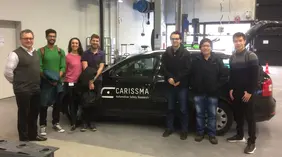The recent successes of the international research group AISS, which has been established at the CARISSMA research and test center under the leadership of the Brazilian guest lecturer Prof. Dr. Alessandro Zimmer since the end of 2017, show that it is worthwhile for THI to open itself to internationalization. Mr. Zimmer, who initially initiated the AWARE network with the THI at his home university Universidade Federal do Paraná (UFPR), was brought to the CARISSMA test center as a guest professor in 2017 to establish the competence field Predictive Sensor Systems for Safe Automated Driving at the THI.
The calculation seems to work out. In just 2.5 years, the professor, who specializes in computer vision, image processing and artificial intelligence, has built up an international research team of 12 people from Germany, Portugal, Brazil, the UK and India: one post-doc, three doctoral students, seven master students and one bachelor student. In addition, Zimmer has already published ten scientific papers since his employment at the THI. Together, the team has raised a total research budget of €1.5 million, including the recently approved SAVE-ROAD project from the Bavarian Research Foundation with €335,000, which aims to safely predict the severity of traffic accidents using artificial intelligence and machine learning.
The established research network is impressive: Industrial partners include Audi, Continental, Airbus, EFS, Silicon Radar, PCO and Expleo. Funding is provided by the German Federal Ministry of Economics and Energy (BMWi), the Federal Ministry of Education and Research (BMBF), the European Union's Horizon 2020 funding program and the German Academic Exchange Service (DAAD). Zimmer's international research network also continues to contribute to the international visibility of THI research: Through Zimmer, the THI gained five new international university partners: L'École de technologie supérieure Montréal, Pontifícia Universidade Católica do Paraná (PUCPR), Universidade de Campinas (Unicamp), Universidade de São Paulo (USP) and Universidade Federal do Maranhão (UFMA).
In addition to the economic and scientific successes his team has achieved for CARISSMA, his team also shapes an increasingly international atmosphere in CARISSMA, which encourages more international students and scientists to gain practical and research experience there. And this, in turn, benefits THI research: because in view of the growing shortage of young scientists from the region, it is becoming increasingly important to fill the need for young scientists from the international environment. This is a prime example of the fact that internationalization is not an end in itself.

